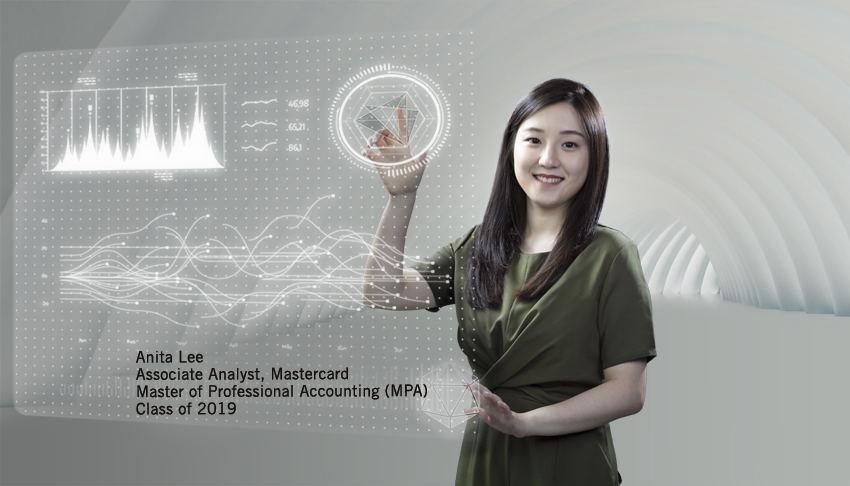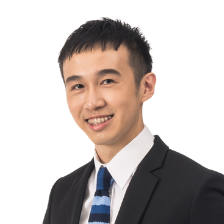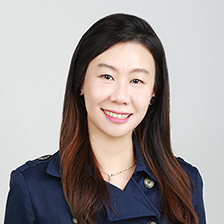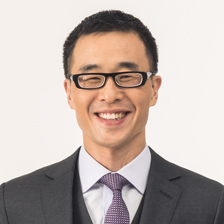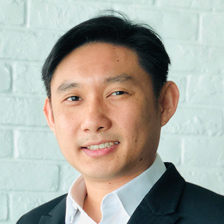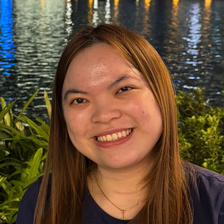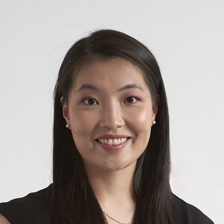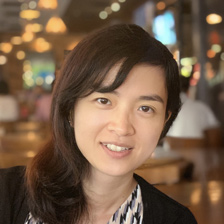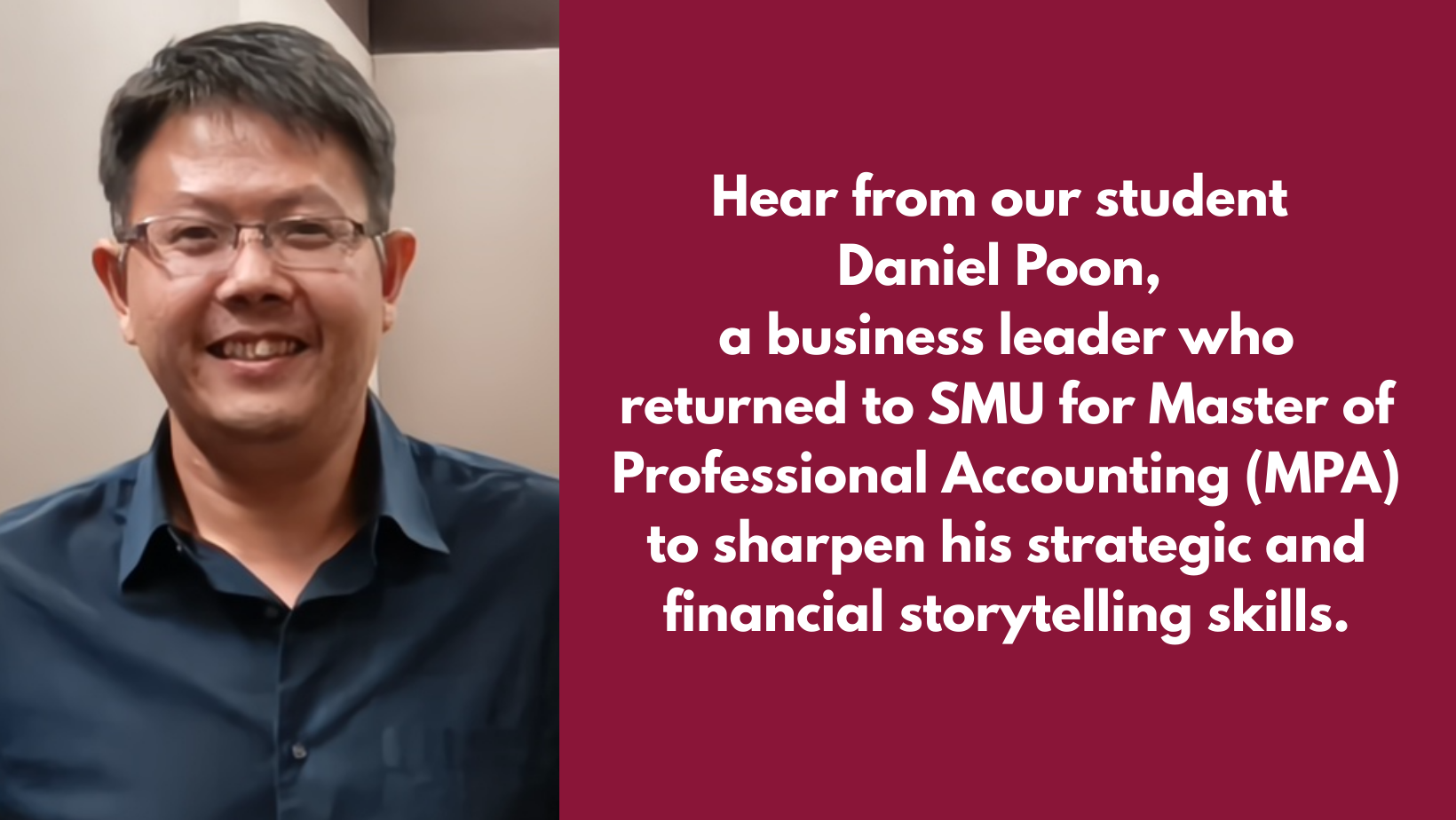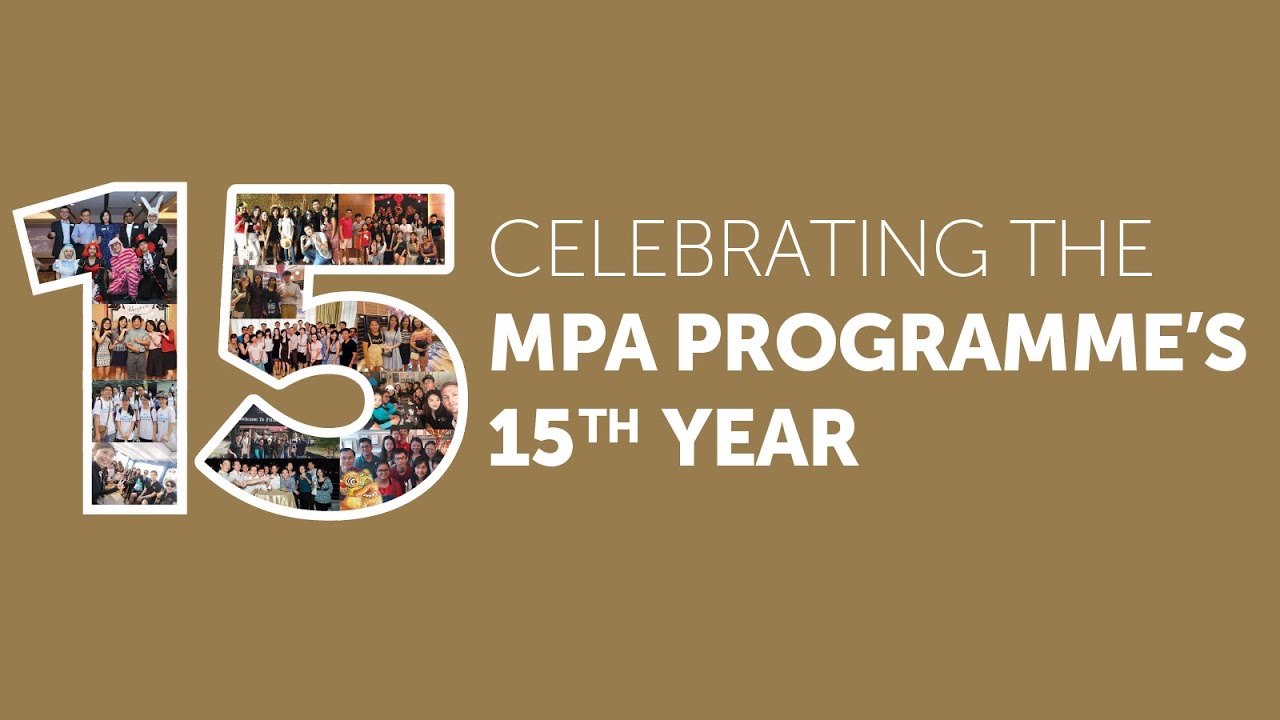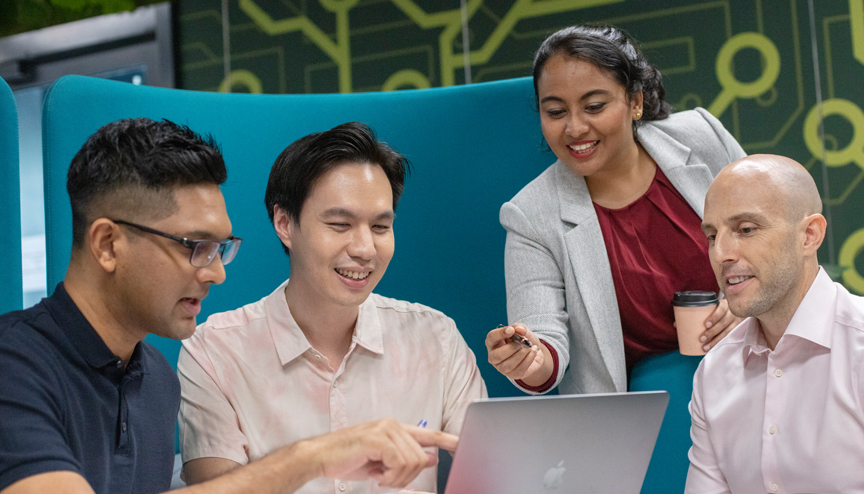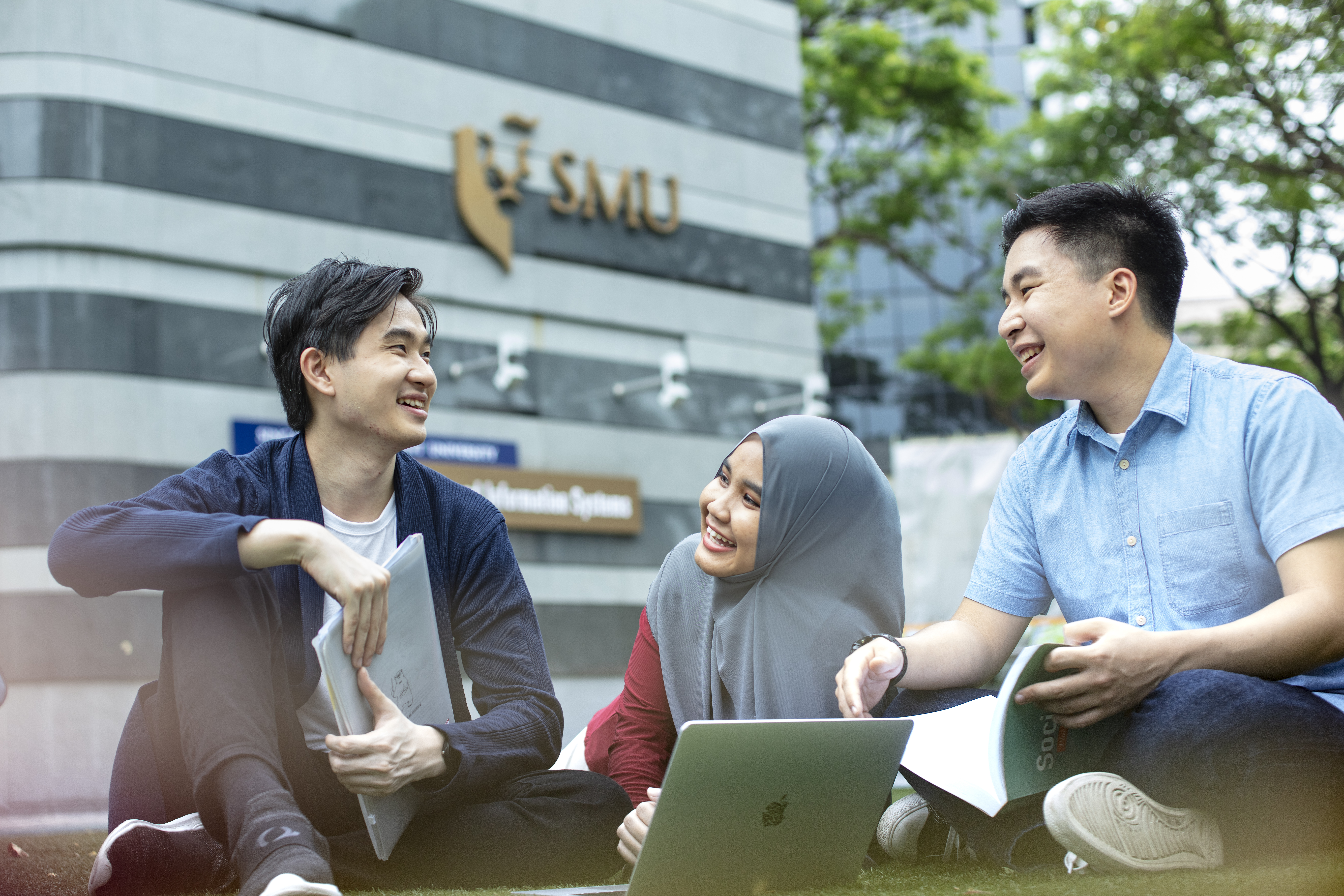-
18
months duration (Full-Time) (with flexibility to complete in 12 months)
-
24
months duration (Part-Time)
-
SGD 58,860 TUITION FEE (INCLUSIVE OF GST)
Goods and Services Tax (GST) is a tax collected on behalf of the Singapore Government and will be charged at the prevailing rate
-
Application Closes
May 2026 (for August 2026 intake)
-
Prerequisites
Good Bachelor's Degree
Sufficient background in Mathematics or Calculus
SMU Admissions Test / GMAT / GRE
TOEFL / IELTS (if your undergraduate studies was not conducted in English)
-
Whatsapp +6568085450
For new admissions and programme enquiry
-
Chat with our friendly MPA Ambassadors
About The Master Of Professional Accounting
Cut an exciting new career path in the accountancy sector, whether in professional services or corporate accounting, across diverse industries. Not only does the SMU MPA offer an accelerated route towards qualification for CPA or CA status, it is also ideal for those needing accounting knowledge in their expanded roles. Unlock global opportunities in an evolving corporate world.
Why pursue the MPA?
-
1
Singapore’s most accredited graduate accounting programme
Gain easy advancement to a wide range of Chartered Accountant (CA) and Certified Public Accountant (CPA) qualifications through SMU MPA’s list of accreditations that include that of 10 different regulatory, professional and academic bodies.
-
2
High graduate employability
Secure employment quickly with one of the most versatile degrees. More than 88%* of SMU MPA graduates are employed within six months of graduation. Whether your goal is to work in professional services, finance or corporate accounting, you can be assured that SMU MPA graduates are among the most sought after by employers.
*Based on a survey conducted for students who graduated in 2024.
-
3
Internships and global immersion programme
Be equipped with the real-world and international perspectives needed to excel in a global business world through the industrial internships and overseas study immersion programmes or exchanges offered as part of the MPA.
-
4
World-class faculty and industry leaders
Gain access to industry professionals and leaders with real-world insights, in addition to being taught by a handpicked team of experienced and distinguished academics and educators from across the six different schools of SMU.
Class Profile
-
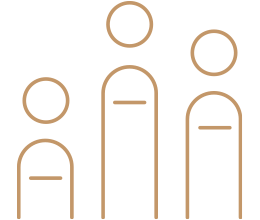 Age Range
Age Range20s - 50s
-
 International Students
International Students94%
-
 NATIONALITIES
NATIONALITIES9
-
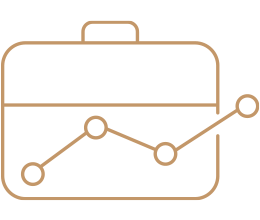 Average Years of Work Experience
Average Years of Work Experience3 yrs
-
 Average GMAT
Average GMAT682

Testimonials
Industries MPA Graduates Work In
-
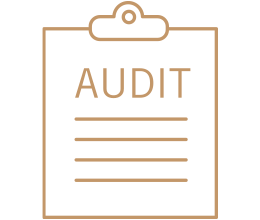 Audit / Accounting
Audit / Accounting68.97%
-
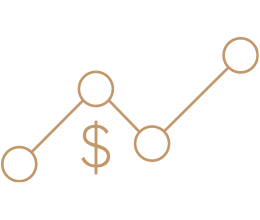 Financial Services
Financial Services10.34%
-
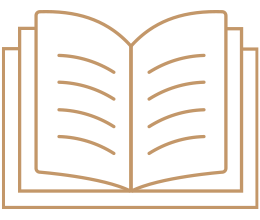 Education
Education6.90%
-
 Healthcare
Healthcare3.45%
-
 Manufacturing
Manufacturing3.45%
-
 Media
Media3.45%
-
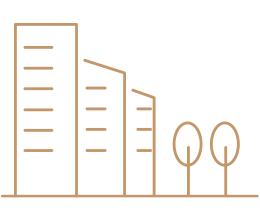 Real Estate
Real Estate3.45%

Programme Details
Programme Calendar
Full-time
Part-time
Programme Information
The accounting sector in Singapore is undergoing a major transformation to realise its aim of becoming a leading global accountancy hub for Asia Pacific. To achieve this vision, one of the key initiatives implemented was the creation of new pathways to facilitate entry of degree holders from non-accountancy disciplines.
Introduced in 2006, the SMU MPA has been providing this pathway to new exciting career opportunities in the accountancy sector, both in professional services and corporate accounting. The adequacy and relevancy of our curriculum content is evidenced by the accreditations and endorsed status received from the licensing authority and professional bodies listed below:
AACSB International
Certified Management Accountants Australia (CMA)
Institute of Chartered Accountants in England and Wales (ICAEW)
The SMU MPA is accredited by the Institute of Chartered Accountants in England and Wales (ICAEW), and credit for prior learning (CPL) will be granted to SMU MPA graduates for the following subjects. You can also front-load the modules, meaning that you can start on the ICAEW Qualification while concurrently pursuing your MPA.
- Accounting
- Assurance
- Business, Technology and Finance
- Law
- Management Information
- Principles of Taxation
- Financial Management
- Business Strategy and Technology
CPA Australia
The SMU MPA is accredited by CPA Australia, and exemptions will be granted to SMU MPA graduates for the following foundation exams. Students who are interested in the CPA Australia accreditation will be required to take the Foundation in Economics elective course.
- Economics and Markets
- Foundations of Accounting
- Fundamentals of Business Law
- Business Finance
- Financial Accounting and Reporting
- Management Accounting
Chartered Institute of Management Accountants (CIMA)
The SMU MPA is accredited by Chartered Institute of Management Accountant (CIMA), and exemptions will be granted to SMU MPA graduates for the following foundation exams.
All business accounting exams will be exempted as well as a range from the Enterprise, Performance and Financial pillars.
- BA1 Fundamentals of Business Economics
- BA2 Fundamentals of Management Accounting
- BA3 Fundamentals of Financial Accounting
- BA4 Fundamentals of Ethics, Corporate Governance and Business Law
|
Enterprise Pillar |
Performance Pillar |
Financial Pillar |
|
E1 Organisational Management |
P1 Management Accounting |
F1 Financial Reporting and Taxation |
|
E2 Organisational Management |
P2 Management Accounting |
F2 Financial Reporting and Taxation |
|
E1 Organisational Management |
|
|
Accounting and Corporate Regulatory Authority (Singapore)
Institute of Singapore Chartered Accountants (ISCA)
The Institute of Singapore Chartered Accountants (ISCA) is the national accountancy body of Singapore. ISCA’s vision is to be a globally recognised professional accountancy body, bringing value to our members, the profession and the wider community.
The Institute of Singapore Chartered Accountants (ISCA) was officially appointed as the Administrator of the Singapore CA Qualification on 1 April 2013 by the Singapore Accountancy Comission (SAC). The following Singapore CA foundation programme modules can be exempted for graduates of the MPA programme, giving you an accelerated pathway to becoming a Chartered Accountant.
- Principles of Financial Reporting
- Advanced Financial Reporting
- Accounting for Decision-Making
- Assurance
- Financial Management
- Singapore Taxation
Chartered Accountants Australia and New Zealand (CA ANZ)
Association of Chartered Certified Accountant (ACCA)
The SMU MPA is accredited by the Association of Chartered Certified Accountants (ACCA), and exemptions will be granted to SMU MPA graduates for the following papers. You can also front-load professional papers, meaning that you can start on the ACCA Qualification while concurrently pursuing your MPA.
- F1 The Accountant in Business
- F2 Management Accounting
- F3 Financial Accounting
- F4 Corporate and Business Law
- F5 Performance Management
- F6 Taxation
- F7 Financial Reporting
- F8 Audit and Assurance
- F9 Financial Management
Institute of Management Accountants (IMA)
These recognitions offer an accelerated pathway for MPA graduates to satisfy the membership requirements of these global professional bodies and to qualify for the CPA or CA status. Such recognition give SMU MPA graduates International mobility and a strong competitive edge over other graduates.
The MPA curriculum provides you with strong business fundamentals, technical skills for various accounting functions and professional accounting services. You can complete the programme in one year on a full-time basis, or over two years on a part-time basis.
Leveraging the unique SMU pedagogy, faculty and state-of-the-art city campus, professional recognition of the SMU MPA equips you with the necessary and relevant skill sets for today's competitive global business world.
Please note that the exemptions listed above may be subject to change by the accreditation institute.
Course Structure
The MPA programme consists of 14 course units (CU), including 8CU programme core, 4CU programme electives, 1CU general elective including internship and 1CU postgraduate professional development course.
|
Components |
Courses |
||
|
Programme Core (8 CU) |
|
||
|
Programme Electives (Choose 4 CU)* |
|
||
|
General Elective (1 CU) |
|
||
|
Programme |
|
||
|
Note |
|
|
Components |
Courses |
|
Programme Core (8 CU) |
|
|
Programme Electives (Choose 4 CU)* |
|
|
General Elective (1 CU) |
|
|
Programme |
|
|
Note |
*The list of elective courses offered in a year is subject to changes. ^These four courses are recommended for students who are pursuing professional qualifications such as CA & CPA and plan to work in professional accounting firms. ^Students requesting exemptions from these course(s) and/or programme core coursesmay not be able to obtain exemptions to qualify for professional qualifications such as CA/CPA & CMA. |
This course will introduce you to principles and techniques for data modelling and visualisation, which is an important means by which accountants can communicate insights obtained from data modelling to their intended recipients.
You will learn how to construct visualisations (bar charts, histograms, scatter plots, pie charts, etc.) and develop dashboards and other interactive visualisations in a manner that supports decision making in accounting. In particular, you will learn how to interpret data presented in the charts constructed to solve accounting problems.
This course aims to provide knowledge of topics involved in the day-to-day financial management operations of a corporation as well as advanced analytical techniques that can help create value to companies and organisations. It aims to develop your ability to use the techniques involved in analysing and evaluating corporate managerial problems and making sound decisions.
This course provides you with a foundation in business organisations, management functions and strategy implementation.
The first section of the course will introduce you to the concepts of business organisation, operating environments, leadership, team building and management. The second half of the course will focus on the process of strategy development and implementation, and performance management.
This course provides you with an introduction to accounting as “the language of business”. It examines the basic concepts, principles, procedures and approaches underlying the accounting process. This understanding facilitates the interpretation of financial information, which is necessary for making business decisions. Topics covered include: introduction to the conceptual framework for financial reporting; journal entries, end-of-period adjustments and the preparation of financial statements; accounting for cash, receivables, inventory, property, plant and equipment, other non-current assets, bonds, liabilities, and owners’ equity; cash flow statement; and introduction to financial statement analysis.
This course introduces cost and management accounting topics to enable you to understand how accounting information is used to manage an organisation. The course focuses on the factors that differentiate one company from another. For example, “What makes one company more profitable and/or better managed than another?” The course will look at various functional areas within the firm, ranging from manufacturing to marketing, and from accounting to human relations. In addition, the concept of management, how senior managers plan, implement and control those plans through people will be briefly discussed.
This course examines financial reporting issues and disclosure requirements relating to corporations as well as the analysis and interpretation of financial statements. The emphasis throughout the course will be on the principles and techniques behind the accounting rules underpinning Financial Reporting Standards in Singapore, which are identical to the International Financial Reporting Standards (IFRS), and the analytical tools for evaluating corporate performance and financial position.
This course provides knowledge about the analysis, design and use of accounting information systems. It addresses the following key concepts: role of control in an accounting system; documentation of accounting information systems; database management, processes and modelling; internal controls; and the role of accounting information systems in major processes of the business cycle.
This course provides you with a sound and in-depth knowledge of advanced accounting topics relating to business combinations, inter-corporate investments, consolidation, foreign currency translation, and accounting for financial instruments. Given the rapid changes in the environment of accounting, the course also aims to inculcate an attitude of independent learning by providing a platform for students to develop skills in analysing, deconstructing and determining shifts in financial reporting standards relating to these topics.
This course provides you with a good understanding of the legal environment in which business is carried on, paying particular attention to the aspects that are of special relevance and importance to accountants. The topics are: introduction to law, corporate crime, torts (in particular, negligence), contract law, company law, with contract law and company law forming the bulk of the course. The field is wide; our focus is on the key concepts, issues and strategies.
This course is designed to prepare you for a career in public accounting. The four basic objectives the course intends to achieve are for you to 1) understand the fundamental concepts of audit and assurance, and their impact and importance in today’s business environment; 2) learn to execute the various appropriate audit analyses and procedures performed at different stages of the audit process; 3) recognise the mindset and values required to succeed in the profession, at entry level and beyond; and 4) take active responsibility for, and interest in, your own learning.
This course provides you with a basic knowledge of income tax and goods and services tax. It focuses on practical application of income taxation and GST and will enable you to understand and identify tax issues, compute individual tax and corporate tax liabilities, and evaluate tax exposures in commercial transactions.
This course is designed for accountancy students with an interest outside the traditional field of financial accounting, auditing and taxation. The primary objectives are to give you an insight into the specialised areas of corporate advisory services and to appreciate the technical knowledge and its application in business.
The course focuses on three primary pillars of corporate advisory: performance for growth, conformance for value preservation and sustainability for continued value enhancement. These three segments are embraced under the overarching umbrella of governance and risk management.
This course introduces you to the foundational statistical programming concepts and skills for business analytics through a widely used programming language. Students will also learn how to implement popular statistical learning algorithms using the programming language for data analysis.
Upon completing this course, students will be able to use programming techniques to explore how data is used to assess what drives financial performance and forecast future financial scenarios. Students will understand how financial and non-financial data interact to forecast events, detect financial discrepancies and frauds, predict corporate default, and determine business strategy. This course has been designed to equip students with an algorithmic mindset to create a strategy and make better business decisions through business analytics.
This course introduces you to the blockchain ecosystem, from concept to evolution, from technologies to applications. Students will learn the defining characteristics of blockchain technologies and learn to design, develop and evaluate the application of blockchain technologies in various settings for problem solving.
This course is designed to equip students with the knowledge and skills required to understand and analyze sustainability reports. It covers the principles, frameworks, and standards of sustainability reporting, as well as the practical aspects of data collection, analysis, and presentation.
Events

How to Apply
- Application Period
- General Instructions
- Applicant Self-Service
- Admission Requirements
- Admissions Tests & Score Reports
Application Period
The online application for the August 2026 intake starts 1 August 2025 with the following admissions phases:
Phase 1 - 1 Aug to 31 Aug 2025 (Early Admission)
Phase 2 - 1 Sep to 31 Dec 2025
Phase 3 - 1 Jan to 31 March 2026
Phase 4 - 1 Apr to 31 May 2026
All supporting documents including GMAT/ TOEFL/ IELTS scores must reach us by the stipulated deadlines above.
Please get ready contact details of two referrals for uploading and read the Applicant's Guide to Admission before submitting your application online.
How to Submit Your Application
The first step is to complete the online application form and attach copies of the required documents as instructed. Keep a copy of your submission for your records. Your application will only be processed when we have received all the required documents and payment.
Documents to submit
- Updated Resume
- Undergraduate Degree Scroll
- Undergraduate Degree Transcript
- Any other supporting documents
- SMU Admissions Test/GMAT/GRE
- IELTS/TOEFL if undergraduate degree was not taught in English
- Passport
- Two References: please provide the name, email and contact number of two referees (they can be from your colleagues, superiors or friends). Referees will be notified to complete their referral forms online.
Eligible candidates will be shortlisted for an interview with the Admissions Panel.
Other Information You Should Note:
- Correspondences will be sent mainly by email, please ensure that you check your email regularly.
- Interviews will be conducted between October to June for shortlisted applicants.
- Successful applicants will be informed within 1-2 weeks after the interview.
- Our FAQs cover important information useful to you during your application phase, please refer to them and contact our office for assistance should the nature of your enquiry fall outside of our FAQs.
Once you have submitted your application and have received the application number confirmation email, you can use the Applicant Self Service functions to check your application status or update your contact information.
Please refer to the Applicant's Self-Service Guide, please click here.
The application criteria for the MPA programme are as follows:
- Applicants must demonstrate good prior academic performance in an undergraduate degree from a recognised institution of higher learning.
- Applicants must have sufficient background in Mathematics/Calculus.
- Applicants have the option to take SMU Admissions Test (SMUAT) or GMAT or GRE as an admission test for application to the programme.
- Applicants with relevant working experience will have an added advantage.
- Shortlisted applicants will be invited for an online interview by members of the MPA Admissions Panel.
- Applicants must show proficiency in the English language. A TOEFL (min. score of 90) or IELTS (min. score of 6.5) test is required if the applicant's undergraduate degree was not conducted in English.
You are required to take an Admission Test for admission to the MPA programme, regardless of your academic background or prior qualifications. You may choose to take the GMAT (Graduate Management Admission Test) / GRE (Graduate Record Examinations General Test), or the SMUAT (Singapore Management University Admissions Test). If you have previously taken the GMAT or GRE, it must have been taken within five years of the date of your application submission.
You are strongly encouraged to take the SMUAT if you do not have a GMAT/GRE Score Report. Details of this test will be provided to you once your application has been submitted.
The following groups of candidates are exempted from GMAT/GRE/SMU Admissions Test:
- SMU Bachelor’s degree graduates with a minimum cGPA of 3.0/4.0 (within 5 years of graduation)
- SUTD/NUS/NTU/SUSS/SIT Bachelor’s degree graduates with a minimum cGPA of 3.5/5.0 (within 5 years of graduation)
However, meeting the cGPA academic input does not guarantee acceptance and candidates may still be asked to take the GMAT/GRE/SMU Admission Test.
If your undergraduate studies were not taught in English, you must take the IELTS (International English Language Testing System) or TOEFL (Test of English as a Foreign Language). An IELTS (min. score of 6.5) or TOEFL (min. score of 90) report is required. Either test must be taken within the last two years of your application submission.
You will need to email the unofficial results of your test to the SMU Admissions Office and make a request at the relevant test centre to send your official score report to SMU.
We adopt a holistic approach in our selection process and the overall quality of the applicant determines his/her admission to the programme. This would include prior academic performance at university, work experience, referee reports, interview scores, etc.
Official score reports can be sent via the following Institution Codes:
TESTS INSTITUTION CODES
GMAT: F8D-3B-56
GRE: 2861 (Department Code: 4001 - Accounting)
TOEFL: 9014 (Department Name: Accounting)
SMUAT
The SMUAT is an online test comprising three components: verbal, numerical, and inductive reasoning. This Fact Sheet contains further information. To register for the SMUAT, you will be required to complete the MPA application first of S$100. After you have submitted the application, please log in to the Applicant Self Service portal to make an additional payment of S$125 for the test and send us the payment receipt via email: SOAMasters@smu.edu.sg. Once we have processed the payment, we will get in touch with you to send the test information over email.
More information about SMUAT is available here.
GMAT
More information about GMAT is available on the GMAT website. To enhance the competitiveness of your application, you should attain a GMAT score of 600 or higher, OR a GMAT Focus edition score of 595 or higher (try a GMAT mini quiz)
GRE
More information about GRE is available on the GRE website. To make your application more competitive, you should achieve a minimum GRE combined score of verbal and quantitative components of 312.
Programme Fees
|
Application |
Registration / Deposit |
Tuition Fee |
Payment Schedule |
|
S$100 (inclusive of GST) Application is non-refundable and applicable at time of submissions. |
Registration and Deposit fee is non-refundable* and payable on acceptance to the Programme. The registration fee of S$400 and S$500 (inclusive of GST) covers matriculation, examination fees, orientation activities, library and computer account. The deposit fee of S$5,000 (inclusive of GST) will contribute to first billing of tuition fee. |
S$58,860.00 (inclusive of GST) |
Payment notice will be sent students one month prior to term commencement. |
|
Application |
|
S$100 (inclusive of GST) Application is non-refundable and applicable at time of submissions |
|
Registration / Deposit |
Registration and Deposit fee is non-refundable* and payable on acceptance to the Programme. The registration fee of S$400 and S$500 (inclusive of GST) covers matriculation, examination fees, orientation activities, library and computer account. The deposit fee of S$5000 (inclusive of GST) will contribute to first billing of tuition fee. |
|
Tuition Fee |
|
S$58,860.00 (inclusive of GST) |
|
Payment Schedule |
Payment notice will be sent students one month prior to term commencement. |
*Tuition fees are locked in once the student enters the programme. Singapore Management University reserves the right to alter tuition fees for new incoming cohorts when required.
*For the avoidance of doubt, the deposit shall form part of the total tuition fees for the programme; however, SMU will not refund the deposit should a student withdraw from the programme at any time after accepting the offer.
*Goods and Services Tax (GST) is a tax collected on behalf of the Singapore Government and will be charged at the prevailing rate.
Scholarships and Financial Aid
This scholarship is to incentivise good applicants from ASEAN countries to pursue SMU Master’s Degree programmes, and to increase the diversity and overall learning experience in the classroom. Recipients of the scholarship are expected to be good ambassadors of SMU in general, and to participate actively in student development/outreach activities. One scholarship valued at S$10,000 (inclusive of GST) will be awarded for each Academic Year.
ELIGIBILITY CRITERIA
To be eligible for this Scholarship, you must meet the following criteria:
- Specialised in Finance
- Citizen of an ASEAN member country or observer nations (PNG and Timor-Leste)
- Must matriculate into the SMU Postgraduate programme (no deferment)
- Excellent academic background
- Not a concurrent recipient of any other SMU-funded scholarships
Application is not required for the SMU MASTERS ASEAN Scholarship, which is awarded to students in the MPA Programme after due consideration by the faculty, based on the criteria listed above.
ELIGIBILITY CRITERIA:
1. Academic Excellence: Generally with a minimum GPA of 4.5 out of 5.0 or equivalent in undergraduate studies.
2. Leadership Potential: demonstrated leadership experience through extracurricular activities, work experience, or community service.
3. Global Perspective: Evidence of international experience, such as studying abroad, international internships, or multicultural engagement.
4. Personal Statement: A compelling personal statement outlining career goals and how the scholarship will help achieve them.
ELIGIBILITY CRITERIA:
1. Academic Performance: Generally with a minimum GPA of 4.0 out of 5.0 for the $10,000 level and 3.5 out of 5.0 for the $5,000 level.
2. Professional Achievements: Relevant work experience or internships in accounting or related areas.
3. Extracurricular Involvement: Active participation in relevant clubs, organisations, or community service.
4. Personal Statement: A well-written personal statement demonstrating the candidate’s commitment to accounting.
ELIGIBILITY CRITERIA:
1. Interest in Sustainability: Demonstrated coursework, projects, or volunteer work in sustainability.
2. Academic Achievement: Generally with a minimum GPA of 3.5 out of 5.0 or equivalent in undergraduate studies.
3. Project Proposal: Written proposal of what you will plan to do when you study in SMU related to sustainability.
4. Personal Statement: A personal statement detailing the candidate’s passion for sustainability and future aspirations in the field.
ELIGIBILITY CRITERIA:
1. Entrepreneurial Experience: Demonstrated experience in starting or managing a business independently or within a family business.
2. Academic Achievement: Generally with a minimum GPA of 3.5 out of 5.0 or equivalent in undergraduate studies.
3. Business Proposal: The candidate must submit a business proposal outlining an entrepreneurial venture they are currently involved in or plan to develop, along with evidence of innovative thinking and the potential impact the business could have on the industry or community.
4. Personal Statement: A personal statement describing the candidate’s entrepreneurial journey, challenges, and future goals.
ELIGIBILITY CRITERIA:
1. Leadership Experience: Proven leadership experience in academic, professional, or community settings, with tangible examples of initiatives led and outcomes achieved.
2. Academic Achievement: Generally with a minimum GPA of 3.5 out of 5.0 or equivalent in undergraduate studies.
3. Proven Leadership: A strong recommendation letter from referees highlighting the candidate’s leadership qualities, skills, and impact in academic, professional, or community settings.
4. Extracurricular Activities: involvement in leadership roles in extracurricular activities or organisations.
5. Personal Statement: Written proposal of what you will plan to do when you study in SMU to display your leadership quality.
Established in 2024, the objective of the EY Excellence Scholarship is to motivate exceptional postgraduate students in Singapore Management University’s School of Accountancy, with the aim of spurring them to greater heights of academic excellence. One scholarship valued at S$15,000 (inclusive of GST) will be awarded for each Academic Year.
ELIGIBILITY CRITERIA
- Singapore Citizen or Singapore Permanent Resident.
- Must matriculate into the SMU MPA Programme (no deferment)
- Good academic achievements (minimum cumulative GPA of 3.0)
- While not a requirement, consideration will be given to postgraduates with demonstrated financial needs.
Synonymous with both prestige and a willingness to serve Singapore, the Lee Kuan Yew (LKY) Scholarship marks Singapore’s continuous effort to recognise outstanding individuals with the aptitude and inclination to contribute to our society.
ELIGIBILITY CRITERIA
Applicants, who must be Singapore citizens, will be assessed holistically. This includes their track record of leadership and achievement in their fields of pursuit/professions. Applicants should also have the potential to excel in their fields/professions, which will contribute to and benefit Singapore and our society.
Find out more about the scholarship here.
For more information, please contact psc@psd.gov.sg
The CIMB ASEAN Scholarship is committed towards helping young talent in need to realise their dreams. Going beyond financial support, the Scholarship programme provides exciting professional development and a mentor support system designed to empower the region's young talent to turn their lives around and make a difference for those around them. In recognising the evolving nature of the banking industry, CIMB welcomes applicants from a wide variety of academic disciplines such as applicants studying Computer Science, Data Science and Psychology, apart from degrees traditionally associated with a career in banking such as Accounting, Economics, Finance. To find out more, please visit here.
LPDP is committed to preparing Indonesian future leaders and professionals through scholarships and encouraging research innovation through research funding. LPDP continues to move towards an organisation with high competitiveness, not only on a local scale, but on a regional and even international scale.
We are proud to share that SMU has been recognised as an approved Masters/PhD destination for “all subject” under the LPDP 2023 programme.
Please visit LPDP for more information. Apply for the LPDP scholarship here.
The Financial Services Authority of Indonesia (Otoritas Jasa Keuangan) is an Indonesian government agency which regulates and supervises the financial sector. The OJK Sponsorship is offered to OJK employees who are keen to pursue a Master or Doctoral degree in SMU. OJK employees may contact their HR department to find out more about the sponsorship and eligibility criteria.
- The SkillsFuture Level-Up Programme offers Singaporeans aged 40 years and above the opportunity to receive the SkillsFuture Credit (Mid-Career) Top-up of S$4,000. This credit is intended to help offset out-of-pocket tuition fees, starting from the Academic Year 2024/2025 intake, commencing on or after 1 May 2024. Please visit https://www.skillsfuture.gov.sg/level-up-programme for further details.
- up to 90% course fee subsidies are not eligible for MPA programme. Please visit https://www.skillsfuture.gov.sg/initiatives/mid-career/enhancedsubsidy for further details.
- Singapore Citizens with eligible Post-Secondary Education Account (PSEA) may utilize balance funds for tuition fees. Click here for more details.
- Students seeking financing aid may approach their local bank(s) directly to enquire and apply for the various study loan packages.
|
SMU Discount Scheme |
Eligibility |
Amount |
Exemption Discount* |
|
SMU Alumni Discount |
SMU UG/PG alumni |
$8,000 |
Up to 4 CUs exemption at $3,000 each (for alumni of local AUs and PUs) |
|
SC/PR |
Singapore Citizens/ Permanent Residents |
$5,000 |
|
|
Partner Universities and Local AUs (SMU/NUS/NTU/SIT/SUSS/SUTD) |
Partner Universities and Local AUs |
$4,000 |
|
|
ASEAN |
ASEAN nationals |
$3,000 |
|
|
Corporate |
Corporate Partners |
$6,000 |
*Only for specifically identified exempted courses with prior studies at PU/SMU, typically requiring a satisfactory performance for recognition. Note that exemptions may result in ineligibility of professional accreditations.
Each student is only eligible for one discount. Should a student qualify for more than one discount, only the higher discount will be applicable.
The Singapore Management University reserves the right to amend the discount schemes for new incoming cohorts when required.
Terms & Conditions Apply.
For more information, please call 6333 7777.
For enquiry on this, please contact:
Selva Kumaran
Senior Executive
DID: (65) 6661 2157
Email: selva.subramaniam@cimb.com
For more information, please call 6333 0033 or visit https://www.posb.com.sg/personal/loans/education-loans/posb-further-study-assist
Email: personalloans@dbs.com
The application must be with a joint applicant who is a Singaporean or Singapore PR. More details are available at http://info.maybank2u.com.sg/personal/loans/personal-credit/mb-education-loan.aspx
Contact Person:
Mr Javier Chan
Personal Finance Executive
DID: (65) 6338 6543
Email: chan@maybank.com.sg
For more information please call 1 800 323 0100 or visit http://www.rhbbank.com.sg/personal/loans/education_loan.html.
Contact Person:
Cheryl Chan
DID: (65) 8139 9820
Email: cheryl.chan@rhbgroup.com
For more information please call 1 800 438 3333 or visit https://www.frankbyocbc.com/products/investments/edu-loan/
Indian nationals admitted to SMU are eligible to acquire study loan against security given by them from SBI in India. Visit www.sbising.com for more details or call 1 800 724 7464 / 6228 1116.

FAQ
The MPA programme consists of 14-course units (CU), including 8CU programme core, 4CU programme electives, 1CU general elective including internship and 1CU Postgraduate Professional Development Course. Full-time students complete the programme over 18 months and part-time students over 24 months, commencing in August of each calendar year. Full-time students will continue from August to January after Term 3 for internship and/or exchange/overseas immersion programme. Part-time students will be enrolled in the evening classes. All students will officially graduate around February and attend the graduation ceremony in July or August.
There is only one admission intake in August each year.
Each term starts on the 3rd week of August. However, international students may be required to be in Singapore earlier to partake in Orientation and other activities which are required for the programme. Please contact us directly should you wish to find out the exact start date.
Assessment varies across courses but generally, it would comprise class participation, continuous assessment, group projects or cases, and a final examination.
Internship is elective and is highly recommended for students with less than two years of work experience. Our Office of Career Services invites firms on-campus for career talks and networking sessions. They also provide assistance to students who are interested to locate an internship during their course of studies. Students gain firsthand experience working in the accounting industry.
You will need to apply to a professional accounting body for membership. The rule for advancement to CPA or CA status may differ from one professional body to another. In general, you would need to complete a set of examinations (which you may be partially exempted from) and meet practical experience requirement. Candidates are encouraged to contact the various professional accounting bodies directly regarding qualifying requirements. We highly recommend visiting the respective professional accreditation website to check updated details.
- Applicants must demonstrate good prior academic performance in an undergraduate degree from a recognised institution of higher learning.
- Applicants must have sufficient background in Mathematics/Calculus.
- GMAT or SMU Admission Test* is a compulsory requirement for admission to this programme.
- Applicants with post-undergraduate working experience will have an added advantage.
- Shortlisted applicants will be invited for an interview by members of the MPA Admission Panel. For international students, telephone interviews will be conducted if they are not in Singapore.
- Applicants must show proficiency in the English language. A TOEFL or IELTS test is required if the applicant's undergraduate degree was not conducted in English.
*More information about SMU Admission Test is available here. Candidates may only take the SMU Admission Test after they have submitted the online application form. Please contact the administration office - SOAMasters@smu.edu.sg to take the SMU Admission Test.
As a number of our courses in the programme are quantitative in nature, a good background in mathematics/calculus is essential to enable you to progress through these courses. Some of the criteria that will be used in evaluating the applicant's background in mathematics/calculus include:
- GMAT score with a minimum score of at least 60 percentile for quantitative component; or
- Satisfactory completion of some mathematical courses at a university level; or
- Have completed at least two mathematical courses at polytechnic level with minimum B grade; or
- An acceptable foundation in mathematics at GCE A-level or O-level or its equivalent.
Though work experience is not a compulsory requirement, it provides students with a valuable dimension to the course and will be considered favourably by the MPA Admission Panel.
In general we regard sponsorship by current or future employers as an important additional piece of evidence of your value to the employer and future career potential, but the admissions panel will not place undue weight on this.
Our accreditation from the professional bodies specifically states that our applicants must have a bachelor's degree. Applicants without a bachelor's degree will not be eligible for the programme.
Foreigners are eligible to apply as long as they hold an employment or dependent pass. For more information, please visit https://www.ica.gov.sg
We require applicants to take the GMAT (Graduate Management Admissions Test). GMAT measures basic verbal, mathematical, and analytical writing skills that you have developed over a long period of time in your education and work. The score report gives separate scores for the quantitative and verbal sections of the test, as well as a total score. There is also a short analytical writing section. The GMAT is used to ensure fairness, objectivity and validity in selection and provides supplementary information to that contained in the application form.
More information is found in the GMAT website. The website provides information about preparing and registering for the GMAT test.
In Singapore, you can take the GMAT at designated Pearson VUE test centers or online from your own computer. You must register for the exam on the official mba.com website, where you can then find available test dates, times, and locations to schedule your exam.
GMAT 600 or higher, OR GMAT Focus edition score of 595 or higher, OR GRE 312 (VR+QR).
Yes, you can retake GMAT/GRE but retaking the test is only recommended if you believe you have under-performed significantly at the first attempt. Please be well prepared before you go for your GMAT/GRE test as GMAT/GRE can only be taken once a month. We will use your highest valid GMAT/GRE score.
If the rest of your application is completed, you can send it to us, even if you have not taken the GMAT/GRE. Candidates without GMAT/GRE or with low scores have the option to sit for the SMU Admissions Test (SMUAT). The SMUAT is an online test that can be done from home. However, if you dont sit for SMUAT, then we will need your GMAT/GRE score to assess your application. You should email us your unofficial scores as soon as you receive them and arrange with the test centre for the official score report to be sent to SMU. SMU's GMAT institution code for MPA is F8D-3B-56.
Every applicant is required to take the SMUAT/GMAT/GRE, regardless of their academic background or prior qualifications. Our applicants come from very diverse backgrounds with different types of academic qualification. SMUAT/GMAT/GRE is a useful common benchmark to assess the applicants objectively and fairly.
However, the following groups of candidates are exempted from SMU Admissions Test/GMAT/GRE:
- SMU Bachelor’s degree graduates with a minimum cGPA of 3.0/4.0 (within 5 years of graduation)
- SUTD/NUS/NTU/SUSS/SIT Bachelor’s degree graduates with a minimum cGPA of 3.5/5.0 (within 5 years of graduation)
However, meeting the cGPA academic input does not guarantee acceptance and candidates may still be asked to take the GMAT/GRE/SMU Admission Test.
GMAT/GRE scores are valid for 5 years after the test date. If your GMAT/GRE results are older than 5 years, you will need to re-sit your GMAT.
Minimum TOEFL iBT (90) / IELTS (6.5) score is required, as each applicant is evaluated on all the credentials.
IELTS/TOEFL scores are valid for 2 years after the test date.
Application starts in August , and closes in in May for August intake. Early application is encouraged.
All applicants must complete an online application form. The application form requires details on educational background, professional training, employment and work experience, personal information, etc. Applicants must also provide a personal statement explaining why they want to take the programme and how it fits with their career aspiration. You will need to take the SMU Admission Test or Graduate Management Admission Test (GMAT)/GRE. Candidates may only take the SMU Admission Test after they have submitted the online application form. Please contact the administration office to take the SMU Admission Test. For the GMAT or GRE, please arrange for the score report to be sent to SMU MPA either through your account or by contacting the test center. Applicants are also required to provide contacts and details of two referees (an automated email upon submission of application will be sent to them to fill up the referral form) and to attend an admission interview by members of the MPA Admission Panel.
Yes, there is a non-refundable application fee of S$100 (inclusive of GST). You are encouraged to pay by credit card or cheque payable to Singapore Management University. For international applicants, please make an online payment or by a bank draft/cheque payable in Singapore dollars to Singapore Management University.
Please refer here for the prevailing tuition fee, payable in two instalments. Fees will be collected before the start of Term 1, and Term 2. In addition, a registration fee of S$400 (inclusive of GST) (Singaporean/PR); S$500 (inclusive of GST) (Foreigner) (non-refundable) is payable upon acceptance into the MPA programme. Students are required to pay a deposit of $5000 (inclusive of GST) upon acceptance into the programme. This is collected together with the registration fee and the deposit will be use to offset first tuition fee instalment. Click here for more details on fees.
No, the tuition fee is the same regardless of the number of exemptions granted.
Selected scholarships are available for MPA programme and will be used to offset tuition fees. Scholarships are awarded based on merit and evaluated using several factors, including prior academic performance, admission test scores, employment history, anticipated contributions to the program, interview results, and career aspirations. Note: Not all students will receive the scholarship. For education loans, there are some banks in Singapore that provide study loans too. These typically require guarantors who must be citizens or permanent residents of Singapore. Please contact banks for more information and requirements.
No. The Singapore CPF Board does not allow CPF funds to be used for postgraduate studies.
Only shortlisted applicants are invited for a personal interview. This will allow us to assess the applicants holistically, taking into account his/her achievements in all areas and to select candidates who have the commitment, experience, motivation and potential to benefit from, and contribute to, the programme.
Our Graduate Programmes & Professional Development (GPPD) Office will assist all international students who have been admitted to the programme, in their application for student pass, which is processed and approved by the Immigration Checkpoints Authority (ICA). The student pass is valid for the whole duration of the course of study. Please click here for more details on the application of the student pass.
- A valid passport
- A letter of offer from SMU (You must have done your online acceptance)
Application for student pass is done online at the Immigration Checkpoints Authority (ICA) website. You must receive a SOLAR application number from SMU before you can submit your application online. The Graduate Programmes & Professional Development Office will be liaising with all accepted international applicants with regards to student pass application. Correspondences will be sent by email, thus please ensure that you have stated a valid email address in your application.
For students who require visa to enter Singapore, the student pass application includes a Single-Journey Entry Visa for ONE-MONTH stay in Singapore till all formalities has been completed upon your arrival in Singapore. We will send the approval letter via email once your student pass is approved, so that you may use the letter as a visa to enter Singapore. You are not required to apply for a separate visa.
If you wish to visit Singapore for personal reasons, the Immigration and Checkpoints Authority (ICA) website will give you a list of countries whose nationals require visas to enter Singapore.
With effect from 1 March 2000, Immigration Checkpoints Authority requires all applicants for long-term passes, including Student's Passes, to undergo a medical examination. This includes a general physical medical examination, a chest x-ray and a test for AIDS-causing Human Immunodeficiency Virus (HIV). The examination must be conducted by approved hospitals / clinics in Singapore . This rule applies to anyone visiting Singapore for 6 months or more for the purpose of education.
If you are a new applicant and not in Singapore, the medical examination can either be done in your home country or in Singapore by a qualified doctor.
However, the medical examination required for subsequent renewal of the Student's Pass must be done in Singapore. The doctor must record and certify the results of the medical examination in the designated medical report form.
The medical report should not be issued more than three months from the submission or renewal date of your application; and should be translated in English. If a medical report is submitted to the Immigration & Checkpoints Authority or Ministry of Manpower not more than two years from your submission date, there is no need to re-submit a fresh medical report.
You can also walk in to Raffles Medical Health check clinic, they are open from 8.30am to 4pm and is the closest to SMU.
Their address as follows:
Raffles Medical@ Raffles Hospital Health Check Counter, 585 North Bridge Road
On early termination of your studies (e.g. withdrawal or refused re-admission) at the University, students should bring their Student's Pass to the Immigration and Checkpoints Authority (ICA) within 7 days of cessation of the studies for cancellation.
A full-time matriculated international student of the university holding a valid Student's Pass may take up employment in Singapore during the vacation and is exempted from applying for a work permit as stated in the Work Permit Exemptions Notification.
However, during term time, a student holding a valid Student's Pass is only allowed to work part-time for less than 16 hours per week. A letter of consent is not required from the Immigration and Checkpoints Authority or the university.
We do not arrange accommodation for students; however, there is a variety of accommodation available in Singapore such as student hostels and private apartments. Click here for more information on accommodations.
Singapore uses the Red and Green Channel system for customs clearance. Proceed to the Red Channel if you carry the following items or are not sure:
- Prohibited items
- Controlled or restricted items
- Taxable or dutiable items exceeding your GST Relief or duty-free concession
- Items for which no GST Relief or duty-free concession is granted
If you have nothing to declare, please use the Green Channel. Please visit the Singapore Customs website for more information.
You can obtain information on Singapore's tourist attractions from the Singapore Tourism Board (STB) website, Visit Singapore.
Your monthly expenditure is highly dependent on your course of study, lifestyle and personal needs. As a rough guide, an international student may expect to incur the following:
| Item | Amount |
|
Accommodation |
$500 - $1500 per month (inclusive of GST) |
|
Utilities |
$80 - $150 per month (inclusive of GST) |
|
Food |
$300 - $450 (inclusive of GST) |
|
Public Transport |
$50 - $100 per month (inclusive of GST) |
|
Telecommunications |
$30 & above (inclusive of GST) |
|
Books & Stationery |
$100 - $300 per term (inclusive of GST) |


